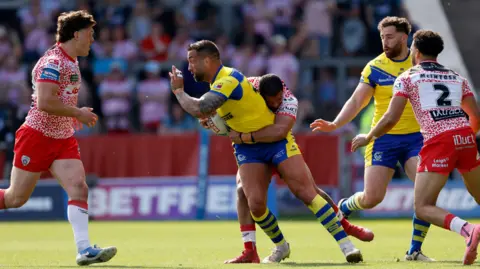The rugby league community is currently expressing growing frustration regarding the absence of knighthoods or damehoods for its players over the past 130 years. This significant period without such honors has raised questions about the treatment of rugby league within the broader context of the UK’s honors system. Notably, the Rugby Football League (RFL), which oversees the sport, has publicly stated that players have been “poorly treated” in this system, prompting calls for rectification.
A spokesperson for the RFL articulated this sentiment, remarking, “It is surprising and disappointing that the relevant authorities have still not deemed anyone worthy of a knighthood or damehood for their services to rugby league.” The statement reflects a sense of injustice felt among advocates of the sport who believe that the accomplishments and contributions of rugby league players are not being duly recognized.
Adding to this dialogue, Sir Lindsay Hoyle, Speaker of the House of Commons and a longstanding supporter of rugby league, echoed these sentiments, stating that the absence of knighthoods for rugby league players is an anomaly when compared to other sports, particularly rugby union, which has seen such honors awarded regularly. Sir Hoyle’s remarks highlighted a perceived inequality within the honors system, emphasizing that rugby league has a rich history and a proud legacy of players who have performed with excellence and inspired upcoming generations.
This issue gained further momentum through comments made by David Baines, leader of a cross-party group of MPs advocating for rugby league. He denounced the situation as a “scandal,” suggesting that it was rooted in class prejudice and snobbery. Baines articulated a belief that the lack of recognition is closely tied to the predominantly working-class background of many rugby league players, suggesting systemic biases that favor participants from more privileged sectors of society. He stated, “This, I suspect, is because they come from working-class backgrounds and didn’t go to the right schools.” His declaration made clear the growing frustrations regarding the honors system’s failure to represent the contributions of working-class individuals.
Sir Lindsay Hoyle’s perspective reinforced the fundamental argument that there is something fundamentally wrong when the rugby league community cannot point to “one single player” who has achieved a knighthood in its entire history. This statement underscores the need for greater recognition within the system that aligns with the sport’s contributions and achievements.
In contrast, rugby union, often perceived as an upper-middle-class sport, has awarded knighthoods for over a century. This distinction was highlighted by noting the honors received by figures such as Sir Bill Beaumont, who was knighted for his services to rugby union football in 2018. The disparity in recognition between the two sports raises significant questions about cultural and social biases present within the honors system in the UK.
Evidence indicates that there has been an under-representation of recipients from northern England and working-class backgrounds within the honors. A BBC analysis showed that only a small fraction of higher awards, like knighthoods and damehoods, were allocated to individuals from these demographics. Complaints about these disparities have prompted government acknowledgment of the flaws in the honors system, leading to discussions about appointing an independent chair to foster diversity and outreach.
As the rugby league gears up for its major annual event, the Challenge Cup Final at Wembley Stadium, the discourse surrounding the need for recognition resonates strongly within the community. Advocates assert that not approving knighthoods for legendary figures—who have fought against racial and class discrimination—reflects an ongoing injustice. Particularly notable figures like Kevin Sinfield, who has raised substantial funds for charity, alongside legends such as Billy Boston, have become symbols of this inequity.
In summary, the call for recognition within the rugby league is not merely about accolades but reflects a deeper social commentary regarding labor, class, and recognition of merit. With key figures advocating for change, the ongoing struggle for equity continues to shape the discourse surrounding sports honors in the UK.



